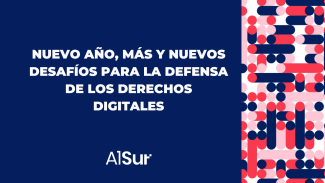New year, new challenges for the defense of digital rights
Reflecting on the past year in the field of human rights advocacy in digital environments is an exercise that begins with an analysis of the problems. 2023, like previous years marked by the pandemic and the War in Ukraine, reminded us that complex situations can escalate further. This year showed that, when it seems that challenges cannot increase, new scenarios always arise to complicate everything.
In addition to facing the climate crisis, whose uncontrollable consequences are becoming more and more evident, the world has had to mourn the war in the Gaza Strip. In this conflict, the human loss rate has surpassed any other in the 21st century, reaching approximately 250 deaths per day and totaling 23,000 Palestinian casualties in 100 days of war. This immense human cost is aggravated by the use of Internet censorship as a silencing tool, evidenced by constant Internet and electricity outages, and questionable content moderation by the platforms, which have shown a tendency to be biased in their coverage of the situation.
During the year we also saw how the use of Artificial Intelligence (AI) models, especially of the generative type, spread massively and with potential risks. If before the problems with these technologies were the lack of transparency of their algorithms and their discriminatory biases, especially in automation systems for public purposes, today these problems are more complex due to their instrumentalization for disinformative processes and cyber attacks. This situation has accelerated a regulatory race driven by States and international organizations, with the creation of international standards such as those of UNESCO, regulations of regional-global impact such as the IA Act in the European Union, and also initiatives in several Latin American countries such as Brazil, Chile, Costa Rica, Peru, among others.
The regulatory effort has expanded to address the growing power of digital platforms and the corporations behind them. Regulation of these platforms has become a critical issue, driven by the need to curb their business model based on extensive surveillance and data collection, as well as their political influence through content moderation practices and monopolistic tactics. However, these regulatory proposals are not without their critics and concerns about their possible effects on freedom of expression. Brazil has stood out in this area with the PL 2630 initiative (Lei de Liberdade, Responsabilidade e Transparência na Internet), which has generated an active role for civil society in the debate about its advantages and challenges.
In 2023, surveillance emerged as a chronic problem that seriously affects the rights to freedom of expression, participation and mobilization. The use of Pegasus software in Mexico, El Salvador and other countries has been revealed in numerous cases, directly impacting journalists and activists. In addition, there has been an increase in the use of mass surveillance technologies in cities, especially in contexts such as the control of protests in Peru and Ecuador, as well as in border management in Brazil, Paraguay and Argentina. Surveillance has thus become one of the main obstacles to democracy.
These challenges represent only part of the complex scenario faced by AlSur organizations and the Digital Rights community at regional and global level. However, not all are problems; there are also answers, achievements and an active participation of an increasingly strengthened civil society.
Below is a summary of some of the progress made by our consortium.
Global agendas, local challenges
In the fast-paced world of digitization, various internet actors, including governments, businesses, international bodies and civil society organizations, are striving to keep pace. The year 2023 was particularly significant in this context, characterized by several global regulatory processes and the quest to establish international standards in areas such as the use of artificial intelligence technologies, the operation of digital services and platforms, the fight against cybercrime and the definition of the foundations for a common digital future.
AlSur organizations actively participate in these processes, guided by the objective of ensuring that the regulations and standards adopted incorporate a human rights perspective. To this end, we seek to significantly influence various international forums and spaces, with the conviction that the different points of view and contributions based on experiences and knowledge should be considered and influence the resulting instruments.
In March we attended, through Coding Rights (Brazil), CELE (Argentina), Derechos Digitales (Chile), Fundación Karisma (Colombia), Hiperderecho (Peru), InternetLab (Brazil) and TEDIC (Paraguay) to the "Internet for Trust" Conference, organized by UNESCO in Paris, France. The conference addressed the regulation of platforms, an important issue for democracies, lives and organizations around the world.
Between March and May, AlSur was involved in the elaboration of its contribution to the Global Digital Compact (GDC) document, an open consultation led by the Tech Envoy of the United Nations General Secretariat that will be part of the Summit for the Future. Our contributions covered a wide range of issues: from the application of human rights online, with a focus on freedom of expression and surveillance, to connecting all people and schools, data protection and the promotion of artificial intelligence regulation.
Another key process was the UN AdHoc Committee to develop the International Convention against Cybercrime. This process, which included six consultations with accredited organizations, attracted the attention of several organizations such as Derechos Digitales, R3D and Hiperderecho. In addition, at AlSur, we seek to articulate internal advocacy strategies, so we organized a closed session with representatives of the governments of Chile, Peru, Bolivia, Dominican Republic, Costa Rica and Panama during RightsCon to influence their perspectives and coordinated a document of proposals from AlSur (Derechos Digitales, Ipandetec, Hiperderecho and R3D) to express our concerns about the text of the document and make suggestions.
Currently, we are focused on coordinating actions related to the regulation of artificial intelligences. This is why we have been working to identify the main international spaces for advocacy on this issue, monitor the progress of the discussions in our countries and jointly elaborate a reflection to be launched soon.
Internal strengthening
After several years of pandemic, in which virtuality was normalized, 2023 was more a year of face-to-face meetings. Thus, AlSur organizations were able to meet and engage in face-to-face conversations on at least four occasions:
- In January 2023, we organized a strategic retreat with all member organizations in the city of São Paulo in Brazil. During this retreat we sought to address the direction of some of our projects, advance the development of our programmatic strategy document, and plan AlSur's next steps in international forums. These decisions guided all the work of the following quarter.
- Midway through the year, in June, we organized a face-to-face meeting in Costa Rica, on the occasion of the RightsCon2023 conference. At this meeting, we reviewed the progress of our planning.
- In August, we organized an internal meeting in Buenos Aires, where we engaged in a dialogue regarding our internal governance and decided to strengthen our structure.
- During October, in Kyoto, Japan, after the IGF 2023, we organized an intense day of internal work aimed at reviewing our internal governance documents and progress, finalizing the elaboration of AlSur's programmatic strategy and deepening the debate on the implications of a meaningful participation of AlSur organizations in international forums.
- In addition, throughout the year, we strengthened our external communication and dissemination channels, emphasizing the dissemination of our blogs and events through our social networks.
Another noteworthy action for our consortium was the organization and execution of the first version of our thematic leveling course for our members. The "onboarding" course, as we call it, was a process led by CELE and InternetLab that allowed us to have an updated curriculum on the main debates on Internet governance, develop skills in the teams of AlSur organizations, and promote a greater meeting. Thus, a face-to-face session was held at the University of Palermo in Buenos Aires, followed by an online version. We hope to repeat the experience in 2024 and project this experience to the entire digital rights community in the region in the future.
At the communications level, we have experienced significant growth. Despite the challenges faced on the "X" platform (formerly known as Twitter), since October 2022, our X account has seen a remarkable increase in followers, from 672 to 2,664. Even with the current restrictions on the platform, we have managed to maintain consistent and effective organic interaction.
In addition, 2023 marked the launch of our LinkedIn account, reaching a total of 15,812 people throughout the year. This new platform has proven to be an effective communication channel, especially during prominent events such as Internet 4 trust, Global Digital Compact, RightsCon2023 and IGF 2023, where we observed significant spikes in interaction with our audience.
Upcoming challenges in times of democratic upheaval
The next two years are likely to see Latin America more active in digitalization debates, both due to the influence of global regulatory processes and the ups and downs of its political momentum. With several electoral processes underway, and recent governments seeking to establish their visions, the discussion on technologies and their impacts will possibly be in the eye of the storm.
The potential setbacks in Argentina, Peru and Mexico, in addition to the discussions of structural legislation in many other countries, such as Brazil and Chile, will require a greater monitoring effort on the part of our organizations.
On the other hand, 2024 will also be a year of major global and regional debates. Between January and February, the discussion process on the International Convention against Cybercrime, a document that is already generating a great deal of concern, will come to a close. April will see the NetMundial+10 event, promoted by Brazil, which will seek to bring together the voices of the Global South around an Internet governance agenda, which, together with Brazil's pro-tempore presidency of the G20, will place it in a position of potential influence in Latin America. At the same time, throughout the year there will be multiple preparatory events for the United Nations Future Summit, thus culminating the process of developing the Global Digital Compact.
In these contexts, the challenges are many, so more than ever, the articulation role of our consortium makes even more sense to ensure that the voices of the South are present.



